Fleurs du Mal Magazine


Or see the index

William Shakespeare Sonnet 30
When to the sessions of sweet silent thought
I summon up remembrance of things past,
I sigh the lack of many a thing I sought,
And with old woes new wail my dear time’s waste:
Then can I drown an eye (unused to flow)
For precious friends hid in death’s dateless night,
And weep afresh love’s long since canceled woe,
And moan th’ expense of many a vanished sight
Then can I grieve at grievances foregone,
And heavily from woe to woe tell o’er
The sad account of fore-bemoanèd moan,
Which I new pay as if not paid before.
But if the while I think on thee, dear friend,
All losses are restored and sorrows end.
William Shakespeare Sonnet 30
Daag ik ter zitting van gemijmer zoet
Herinnering aan zaken lang vergaan,
Dan zucht ik diep om wat ik missen moet,
En lijd nieuw leed om oude tijd verdaan.
Dan laat ik graag een traan (die niet gauw vloeit)
Om vrienden in hun doodsnacht zonder tijd,
Beween weer liefde mij al lang ontgroeid,
En treur om schuld door veel vergetelheid.
Dan klaag ik graag om een belegen klacht,
En tel bedrukt weer neer, van leed tot leed,
De droeve som van wat oud onheil bracht,
Die ‘k kwijt alsof ik die niet eerder kweet.
Maar denk ik dan aan jou, mijn liefste vriend,
Zijn tranen weg, verliezen terugverdiend.
Vertaald door Cornelis W. Schoneveld,
Bestorm mijn hart, (2008, p53), herziening feb. 2012
kempis.nl poetry magazine
More in: Shakespeare, Shakespeare, William
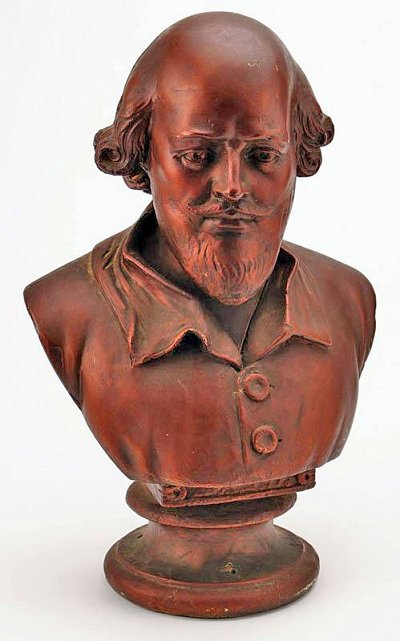
William Shakespeare Sonnet 18
Shall I compare thee to a summer’s day?
Thou art more lovely and more temperate.
Rough winds do shake the darling buds of May
And summer’s lease hath all too short a date;
Sometime too hot the eye of heaven shines,
And often is his gold complexion dimmed,
And every fair from fair sometime declines,
By chance, or nature’s changing course untrimmed;
But thy eternal summer shall not fade,
Nor lose possession of that fair thou ow’st,
Nor shall death brag thou wand’rest in his shade,
When in eternal lines to time thou grow’st:
So long as men can breathe or eyes can see,
So long lives this, and this gives life to thee.
William Shakespeare Sonnet 18
Zal ik je keuren als een zomerdag?
Veel kalmer en veel lieflijker ben jij.
Door ruige wind raakt meibloei teer van slag
En zomer’s pacht gaat al te snel voorbij;
Soms schijnt het oog van d’ hemel al te heet,
En dikwijls wordt zijn gulden blos gedempt;
Eens komt de tijd die aan de schoonheid vreet,
Door ’t lot, of wending der natuur ontstemd;
Maar, tijdloos, zal jouw zomer niet vergaan,
Noch jij onterfd zijn van zijn schoon domein,
Al snoeft de dood, jouw schim treft hij nooit aan,
Daar jij als tijdloos vers in groei zal zijn:
Zo lang de mensheid oog of adem heeft,
Zo lang leeft dit, dat aan jou leven geeft.
Vertaald door Cornelis W. Schoneveld, (herzien feb. 2012)
kempis.nl poetry magazine
More in: Shakespeare, Shakespeare, William
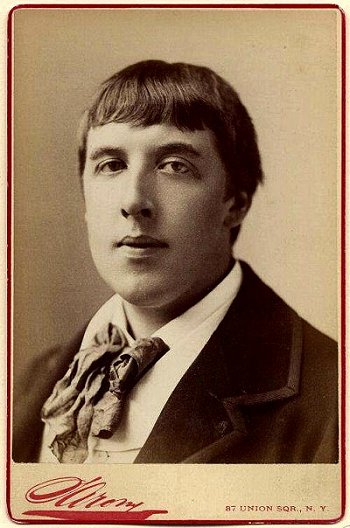
OSCAR WILDE
(1854-1900)
Pan. Double Villanelle
I
O Goat-foot God of Arcady!
This modern world is grey and old,
And what remains to us of Thee?
No more the shepherd lads in glee
Throw apples at thy wattled fold,
O Goat-foot God of Arcady!
Nor through the laurels can one see
Thy soft brown limbs, thy beard of gold,
And what remains to us of Thee?
And dull and dead our Thames would be
For here the winds are chill and cold,
O goat-foot God of Arcady!
Then keep the tomb of Helice,
Thine olive-woods, thy vine-clad wold,
Ah what remains to us of Thee?
Though many an unsung elegy
Sleeps in the reeds our rivers hold,
O Goat-foot God of Arcady!
Ah, what remains to us of Thee?
II
Ah, leave the hills of Arcady,
Thy satyrs and their wanton play,
This modern world hath need of Thee.
No nymph or Faun indeed have we,
Faun and nymph are old and grey,
Ah, leave the hills of Arcady!
This is the land where Liberty
Lit grave-browed Milton on his way,
This modern world hath need of Thee!
A land of ancient chivalry
Where gentle Sidney saw the day,
Ah, leave the hills of Arcady!
This fierce sea-lion of the sea,
This England, lacks some stronger lay,
This modern world hath need of Thee!
Then blow some Trumpet loud and free,
And give thine oaten pipe away,
Ah leave the hills of Arcady!
This modern world hath need of Thee!
Pan. Villanella in tweevoud
I
O Herdersgod met bokkevoet!
De wereld is nu grijs en oud,
En is er iets dat jij nog doet?
Geen herder die jou blij ontmoet
En zich tot appelworp verstout,
O Herdersgod met bokkevoet!
Noch iemand die in ’t bos begroet
Jouw poot zacht, bruin, jouw baard van goud,
En is er iets dat jij nog doet?
De Theems zou dood zijn, zonder vloed,
Want hier zijn winden straf en koud,
O Herdersgod met bokkevoet!
Dus veins dat je Helice behoedt,
Je wijngaard, je olijvenwoud,
En is er iets dat jij nog doet?
Ofschoon veel treurzang men vermoedt
Die ’t riet van beken in zich houdt,
O Herdersgod met bokkevoet!
Is er ook iets dat jij nog doet?
II
Verlaat Arcadië toch gauw,
Waar men de satyrs stoeien ziet,
De nieuwe tijd heeft baat bij jou.
Geen Faun of nimf is hier in touw,
Want Faun en nimf gedijen niet,
Verlaat Arcadië toch gauw!
Dit land is aan zijn Vrijheid trouw,
Waar Milton’s ernst zich op verliet,
De nieuwe tijd heeft baat bij jou.
Een land dat Sidney dienen zou,
Dat oude ridderlijk gebied,
Verlaat Arcadië toch gauw!
Dit zeeleeuwland met scherpe klauw,
Dit Engeland vraagt sterker lied,
De nieuwe tijd heeft baat bij jou!.
Bazuin wat ieder horen zou,
Doe afstand van je herdersriet
Verlaat Arcadië toch gauw!
De nieuwe tijd heeft baat bij jou!
VALLEND BLOEMBLAD
Verzamelde korte gedichten van OSCAR WILDE
Vertaald door Cornelis W. Schoneveld
tweetalige uitgave, 2012 (niet gepubliceerd)
kempis.nl poetry magazine
More in: Archive W-X, Wilde, Wilde, Oscar

William Shakespeare
(1564-1616)
The Sonnets
116
Let me not to the marriage of true minds
Admit impediments, love is not love
Which alters when it alteration finds,
Or bends with the remover to remove.
O no! it is an ever-fixed mark
That looks on tempests and is never shaken;
It is the star to every wandering bark,
Whose worth’s unknown, although his height be taken.
Love’s not Time’s fool, though rosy lips and cheeks
Within his bending sickle’s compass come,
Love alters not with his brief hours and weeks,
But bears it out even to the edge of doom.
If this be error and upon me proved,
I never writ, nor no man ever loved.
116
Laat mij het huwelijk van zielen trouw
Geen hinder toestaan: liefde is liefde niet
Die door een kentering zelf kenteren zou,
Of door de ruimer zich ooit ruimen liet.
O nee! Het is een baken dat steeds staat
En stormen ziend van wijken nooit wil weten;
De ster waar ’t zwervend schip zich op verlaat,
Peilloos, ofschoon zijn hoogte wordt gemeten.
De dwaas der Tijd is liefde niet, hoewel
Zijn zeis de rozenwang omcirkelen mag;
Geen krimp geeft liefde in Zijn kortstondig spel,
Maar houdt het uit zelfs tot de oordeelsdag.
Is dit onwaar en toont men mij dat aan,
Dan schreef ik niets, heeft liefde ook nooit bestaan.
(vertaling Cornelis W. Schoneveld, rev. feb. 2012)
kempis.nl poetry magazine
More in: -Shakespeare Sonnets, Shakespeare

John Milton
On Time
Fly envious Time, till thou run out thy race,
Call on the lazy leaden-stepping hours,
Whose speed is but the heavy plummets pace;
And glut thy self with what thy womb devours,
Which is no more than what is false and vain,
And merely mortal dross,
So little is our loss,
So little is thy gain;
For when as each thing bad thou hast entombed,
And last of all, thy greedy self consumed,
Then long Eternity shall greet our bliss
With an individual kiss,
And Joy shall overtake us as a flood;
When every thing that is sincerely good
And perfectly divine
With Truth, and Peace, and Love shall ever shine
About the supreme throne
Of him, to whose happy-making sight alone,
When once our heavenly-guided soul shall climb,
Then, all this earthy grossness quit,
Attired with stars we shall for ever sit,
Triumphing over Death, and Chance, and thee O Time.
John Milton
Op de Tijd
Vlieg Tijd, jaloers, tot waar je landing ligt,
Spoor loden uren en hun luie stappen aan
Met slechts de valkracht van hun zwaar gewicht;
Zwelg, en verslind wat door je buik kan gaan,
Al is ’t niet meer dan valsheid zonder zin,
Verderfelijk slechts en vies:
Zo klein is ons verlies,
Zo klein is jouw gewin;
Want als jij al het kwade hebt verdelgd,
En dan tot slot je gulzige zelf verzwelgt,
Dan zegent ons de eeuwigdurendheid
Met ’n kus elk toebereid,
En overspoelt ons vreugde als een vloed;
Als alles wat waarachtig is en goed
En opperst goddelijk
Steeds straalt in waarheid, vredig, liefderijk
Rondom de hoogste troon
Van Hem, wiens zaligmakende betoon
Eens onze ziel ten hemel begeleidt,
Dan zetelen wij, alle aardse grofheid kwijt,
Getooid met sterren in de eeuwigheid,
Met zeges op de Dood, het Lot en jou, O Tijd.
Vertaling; Cornelis W. Schoneveld (2012)
kempis.nl poetry magazine
More in: Archive M-N, Milton, John, More translations
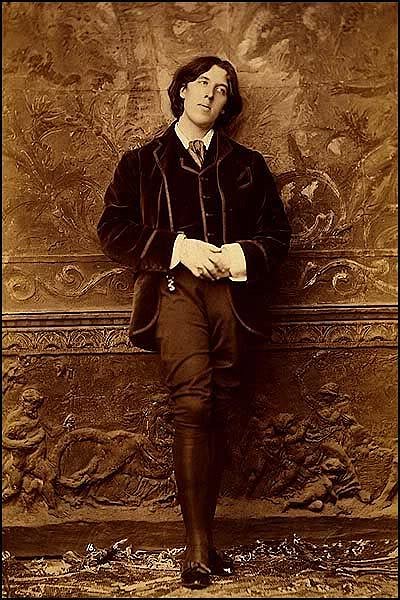
Oscar Wilde
(1854-1900)
The Grave of Keats
(sonnet)
Rid of the world’s injustice, and his pain,
He rests at last beneath God’s veil of blue:
Taken from life when life and love were new
The youngest of the martyrs here is lain,
Fair as Sebastian, and as early slain.
No cypress shades his grave, no funeral yew,
But gentle violets weeping with the dew
Weave on his bones an ever-blossoming chain.
O proudest heart that broke for misery!
O sweetest lips since those of Mitylene!
O poet-painter of our English land!
Thy name was writ in water – it shall stand:
And tears like mine will keep thy memory green,
As Isabella did her Basil tree.
Rome
Oscar Wilde
Het graf van Keats
(sonnet)
In de nieuwe vertaling van Cornelis W. Schoneveld
Van ‘s werelds onrecht en zijn pijn bevrijd,
Rust hij op ‘t laatst onder God’s hemelbaan:
Uit liefde en leven, nieuw nog, heengegaan
Ligt hier de jongste lijder neergevlijd,
Schoon als Sebastiaan, even jong ook dood.
Hier geeft cipres noch taxus schaduw af,
Maar waar viooltjes wenen op zijn graf
Is zijn gebeente nooit van bloei ontbloot.
O hart vol trots dat brak door hoe het leed!
O stem die ‘t zoetst sinds Mytylene’s is!
O schilder-dichter van ons Engeland!
Je schreef je naam in water-hij houdt stand:
En ook mijn traan steunt jouw gedachtenis,
Zoals Isabella’s balsemkruid dat deed.
Rome
VALLEND BLOEMBLAD
Verzameling van 90 korte gedichten van OSCAR WILDE
Vertaald door Cornelis W. Schoneveld
tweetalige uitgave, 2011
ongepubliceerd
fleursdumal.nl nagazine
More in: John Keats, Keats, John, Wilde, Wilde, Oscar

William Shakespeare
Sonnet 111
O for my sake do you with Fortune chide,
The guilty goddess of my harmful deeds,
That did not better for my life provide,
Than public means which public manners breeds.
Thence comes it that my name receives a brand,
And almost thence my nature is subdued
To what it works in, like the dyer’s hand:
Pity me then, and wish I were renewed,
Whilst like a willing patient I will drink,
Potions of eisel ‘gainst my strong infection,
No bitterness that I will bitter think,
Nor double penance to correct correction.
Pity me then dear friend, and I assure ye,
Even that your pity is enough to cure me.
William Shakespeare
Sonnet 111
O, straf jij eens voor mij Fortuna af,
Godin die mij met kwade daden nekt,
En mij aan leven niet veel beters gaf
Dan wat volks geld aan volks gedrag verwekt.
Zo kwam dat brandmerk op mijn naam tot stand,
En dompelde zich bijna heel mijn aard
Daarin waarmee zij werkt, als ‘n ververshand;
Heb meelij dus, en acht iets nieuws mij waard,
En, als ‘n patiënt zo meegaand, drink ik dan:
Azijndrank helpt mij van besmetting af,
Geen bitterheid waar ik niet tegen kan,
Geen dubbele straffen schuw ik voor mijn straf.
Heb meelij dus, mijn vriend, en volg mijn lezing,
Dat meelij al volstaat voor mijn genezing.
(Vertaling: Cornelis W. Schoneveld, januari 2012)
kempis.nl poetry magazine
More in: -Shakespeare Sonnets, Shakespeare

Oscar Wilde
(1854-1900)
Impression du Voyage
(sonnet)
The sea was sapphire colored, and the sky
Burned like a heated opal through the air,
We hoisted sail; the wind was blowing fair
For the blue lands that to the eastward lie.
From the steep prow I marked with quickening eye
Zakynthos, every olive grove and creek,
Ithaca’s cliff, Lycaon’s snowy peak,
And all the flower-strewn hills of Arcady.
The flapping of the sail against the mast,
The ripple of the water on the side,
The ripple of girls’ laughter at the stern,
The only sounds:- when ‘gan the West to burn,
And a red sun upon the seas to ride,
I stood upon the soil of Greece at last!
Katakolo
Oscar Wilde
Reisimpressie
(sonnet)
In de nieuwe vertaling van Cornelis W. Schoneveld
Het zeevlak glom met een saffieren tint,
De hemel stond als hete opaal in brand,
De wind trok aan; we tuigden ‘t want,
Voor ‘t blauwe land dat oostwaarts zich bevindt.
Ik zag vanaf de hoogste stevenkant
Zakynthos’ kreek en zijn olijventrots,
Lycaon’s sneeuwtop en Ithaca’s rots,
En ‘t bloemenrijk Arcadisch heuvelland.
De fok die klapperend om de stag zich wond,
Het water kabbelend voorlangs de boeg,
De meisjes kwebbelend in de kajuit,
Meer klonk er niet – dan brandde langzaam uit
Een rode zon op zee, die ‘m westwaarts droeg,
Ik stond nu eindelijk op Griekse grond!
Katakolo
VALLEND BLOEMBLAD
Verzameling van 90 korte gedichten van OSCAR WILDE
Vertaald door Cornelis W. Schoneveld
tweetalige uitgave, 2011
ongepubliceerd
kempis.nl poetry magazine
More in: Wilde, Wilde, Oscar

William Shakespeare
(1564-1616)
THE SONNETS
Sonnet 106
When in the chronicle of wasted time,
I see descriptions of the fairest wights,
And beauty making beautiful old rhyme,
In praise of ladies dead, and lovely knights,
Then in the blazon of sweet beauty’s best,
Of hand, of foot, of lip, of eye, of brow,
I see their antique pen would have expressed,
Even such a beauty as you master now.
So all their praises are but prophecies
Of this our time, all you prefiguring,
And for they looked but with divining eyes,
They had not skill enough your worth to sing:
For we which now behold these present days,
Have eyes to wonder, but lack tongues to praise.
Sonnet 106
Zie ’k in kronieken van de tijd vergaan
Hoe wezens uiterst fraai beschreven zijn
En schoonheid schoon in oude rijm gedaan,
Met lof op vrouwen dood en ridders fijn,
Dan zie ik in ’t blazoen van zoetste sierlijkheid
Van voorhoofd, oog, van lip, van hand, van voet,
Hoe hun antieke pen zou zijn gewijd
Aan zulk een schoonheid als u eer aandoet.
Dus heel hun hulde is slechts orakeltaal
Op onze tijd, die heel uw beeld voorzegt,
En daar hun blik slechts gissend was en vaal
Deed hun te zwakke zang uw pracht geen recht;
Maar ’t heden dat ons oog het wonder toont,
Verschaft geen tong die dat met lof bekroont.
Vertaling: Cornelis W. Schoneveld
(november 2011)
kempis.nl poetry magazine
More in: -Shakespeare Sonnets, Shakespeare
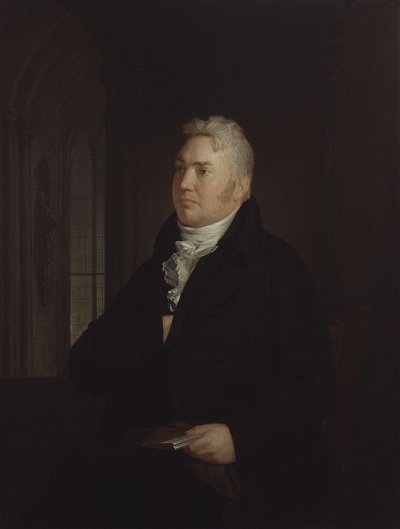
Samuel Taylor Coleridge
(1772-1834)
Frost at Midnight
The Frost performs its secret ministry,
Unhelped by any wind. The owlet’s cry
Came loud – and hark, again! loud as before.
The inmates of my cottage, all at rest,
Have left me to that solitude, which suits
Abstruser musings: save that at my side
My cradled infant slumbers peacefully.
‘Tis calm indeed! so calm, that it disturbs
And vexes meditation with its strange
And extreme silentness. Sea, hill, and wood,
This populous village! Sea, and hill, and wood,
With all the numberless goings-on of life,
Inaudible as dreams! the thin blue flame
Lies on my low-burnt fire, and quivers not;
Only that film, which fluttered on the grate,
Still flutters there, the sole unquiet thing.
Methinks its motion in this hush of nature
Gives it dim sympathies with me who live,
Making it a companionable form,
Whose puny flaps and freaks the idling Spirit
By its own moods interprets, everywhere
Echo or mirror seeking of itself,
And makes a toy of Thought.
But O! how oft,
How oft at school, with most believing mind,
Presageful, have I gazed upon the bars,
To watch that fluttering stranger! and as oft
With unclosed lids, already had I dreamt
Of my sweet birthplace, and the old church tower,
Whose bells, the poor man’s only music, rang
From morn to evening, all the hot fair-day,
So sweetly, that they stirred and haunted me
With a wild pleasure, falling on mine ear
Most like articulate sounds of things to come!
So gazed I, till the soothing things, I dreamt,
Lulled me to sleep, and sleep prolonged my dreams!
And so I brooded all the following morn,
Awed by the stern preceptor’s face, mine eye
Fixed with mock study on my swimming book:
Save if the door half opened, and I snatched
A hasty glance, and still my heart leaped up,
For still I hoped to see the stranger’s face,
Townsman, or aunt, or sister more beloved,
My playmate when we both were clothed alike!
Dear Babe, that sleepest cradled by my side,
Whose gentle breathings, heard in this deep calm,
Fill up the interspersèd vacancies
And momentary pauses of the thought!
My babe so beautiful! it thrills my heart
With tender gladness, thus to look at thee,
And think that thou shalt learn far other lore,
And in far other scenes! For I was reared
In the great city, pent ‘mid cloisters dim,
And saw nought lovely but the sky and stars.
But thou, my babe! shalt wander like a breeze
By lakes and sandy shores, beneath the crags
Of ancient mountain, and beneath the clouds,
Which image in their bulk both lakes and shores
And mountain crags: so shalt thou see and hear
The lovely shapes and sounds intelligible
Of that eternal language, which thy God
Utters, who from eternity doth teach
Himself in all, and all things in himself.
Great universal Teacher! he shall mold
Thy spirit, and by giving make it ask.
Therefore all seasons shall be sweet to thee,
Whether the summer clothe the general earth
With greenness, or the redbreast sit and sing
Betwixt the tufts of snow on the bare branch
Of mossy apple tree, while the nigh thatch
Smokes in the sun-thaw; whether the eave-drops fall
Heard only in the trances of the blast,
Or if the secret ministry of frost
Shall hang them up in silent icicles,
Quietly shining to the quiet Moon.
1798
Samuel Taylor Coleridge
Vorst te middernacht
De vorst werkt stil aan zijn geheime taak,
Geen wind die daarbij helpt. Het uiltje gaf
Zijn luide roep – en hoor, weer! even luid.
Alle bewoners van mijn stulpje slapen nu,
En bieden mij afzondering, die past
Bij diepergaand gepeins: behalve dan
Dat naast mij kalm mijn wiegekindje rust.
Hoe vredig! Zo zeer, dat ‘t bezinning stoort
En tegenwerkt door buitensporige
En vreemde stilligheid. Zee, heuvel, bos,
Dit volk-rijk dorp! Zee, heuvel, bos,
Met al die grote drukte van ‘t bestaan,
Onhoorbaar als een droom! De dunne vlam
Dekt blauw mijn smeulend vuur, en wappert niet;
Maar ‘n film, die trillend op het rooster lag,
Trilt nu nog steeds, en stoort de rust alleen.
Medunkt die onrust in de stilte der natuur
Geeft het wat meegevoel met mij die leeft,
Waardoor zich ‘n deelgenootschap vormt,
En, sluimerend, de geest ‘t zwak fladderen
Door de eigen stemmingen verklaart, op zoek
Naar echo’s of een spiegel van zichzelf,
En spel maakt van gepeins.
Maar O! hoe vaak,
Hoe vaak op school, in goedgelovigheid,
Staard’ ik met voorgevoel de spijlen aan,
En zag die fladderende vreemde! * Vaak
Ook had ik, d’ ogen open, zoet gedroomd
Van waar mijn wieg stond, van de kerkklok,
De enige muziek der arme man, die klonk
Van vroeg tot laat, de ganse, warme dag,
Zo lieflijk, dat het mij ontroerde en greep
Met wild plezier, en in mijn oren zonk
Als ‘t klinkklaar luiden van wat komen zou!
Zo staarde ik, tot ik kalmerend door die droom,
In slaap viel, en die droom weer langer werd!
Zo mijmerde ik de dag daarop nog door.
Mijn oog, bevreesd voor meester’s strenge blik,
Kleefde al spijbelend aan mijn drijvend boek:
Behalve als bij open deur, ik snel
Een blik wierp, en mijn hart weer opsprong,
Want steeds nog keek ik naar de vreemde uit,
Stedeling, tante, zuster meer geliefd,
Mijn makker, nog gelijk gekleed als ik!
Lief kindje, naast mij slapend in je wieg,
Wiens zachte adem, hoorbaar in de rust,
De leemtes en de korte pauzes soms
Verspreid in de gedachtenstromen vult!
Mijn kind, zo schoon! Het schenkt mijn hart
Een tere vreugd, als ik zo naar je kijk,
En weet dat jij veel, anders leren zult,
En in heel ander landschap ook! Want ik
Groeide gekloosterd als een stadskind op,
En zag aan schoons slechts sterren en de lucht.
Maar jij, mijn kind, zult zwerven als een bries
Aan meer en oever, onder aan de kloof
Van ‘n oude berg, en onder ‘t wolkendek,
Dat in zijn opbouw oever, meer, en kloof
Verbeeldt: zo zul je zien en horen ook
De liefelijke vormen en bevattelijke klank
Van die onsterfelijke taal, door God
Gesproken, die zich eeuwig onderwijst
In ‘t al, en alle dingen in Zichzelf.
De grote algehele Leraar! Hij boetseert
Je geest, and zorgt door geven dat die vraagt.
Daarom zal elk seizoen je dierbaar zijn,
Of nu de zomer heel de aarde kleedt
In ‘t groen, of ‘t roodborstje zit en zingt
Tussen de plekjes sneeuw op ‘n kale tak
Van een bemoste appelboom, terwijl
Het rietdak dampt in zonnedooi; of nu
Dakdruppels spetteren bij geluwde wind,
Of dat, door de geheime taak der vorst,
Ze onhoorbaar neerhangen als ijspegels,
In stilte schijnend naar de stille maan.
* Vreemde: de roetfilm die boven het rooster zweeft wordt “overal in het land vreemde genoemd en kondigt de komst van een afwezige bekende aan” (aantekening van Coleridge)
Vertaling Cornelis W. Schoneveld
Uit: Bestorm mijn hart, de beste Engelse gedichten uit de 16e-19e eeuw gekozen en vertaald door Cornelis W. Schoneveld, tweetalige editie. Rainbow Essentials no. 55, Uitgeverij Maarten Muntinga, Amsterdam, 2008, 296 pp, € 9,95 ISBN: 9789041740588
Kempis.nl poetry magazine
More in: Archive C-D, Coleridge, Coleridge, Samuel Taylor
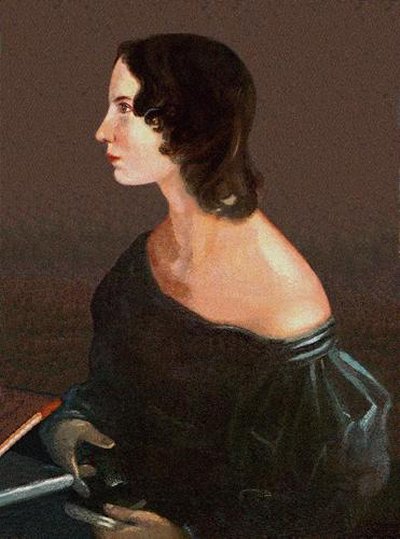
Emily Brontë
(1818-1848)
The Night-Wind
In summer’s mellow midnight,
A cloudless moon shone through
Our open parlour window
And rosetrees wet with dew.
I sat in silent musing,
The soft wind waved my hair:
It told me Heaven was glorious.
And sleeping Earth was fair.
I needed not its breathing
To bring such thoughts to me,
But still it whispered lowly,
“How dark the woods will be!
“The thick leaves in my murmur
Are rustling like a dream,
And all their myriad voices
Instinct with spirit seem.”
I said, “Go, gentle singer,
Thy wooing voice is kind,
But do not think its music
Has power to reach my mind.
“Play with the scented flower,
The young tree’s supple bough,
And leave my human feelings
In their own course to flow.”
The wanderer would not leave me;
Its kiss grew warmer still –
“O come,” it sighed so sweetly,
“I’ll win thee ‘gainst thy will.
“Have we not been from childhood friends?
Have I not loved thee long?
As long as thou hast loved the night
Whose silence wakes my song.
“And when thy heart is laid at rest
Beneath the church-yard stone
I shall have time enough to mourn
And thou to be alone.”
1840
Emily Brontë
De nachtwind
In ‘t milde zomer-nachtuur
Scheen ‘t maanlicht helderblauw
Door de openstaande tuindeur
En rozenboom vol dauw.
Ik zat in rust te mijmeren,
Mij roerde zacht de wind:
Hij vond de Hemel roemrijk,
d’ Aard’, slapend, welgezind.
Zijn adem kon ik missen
Voor zo ‘n gedachtenlijn,
Maar toch sprak hij weer zachtjes,
“Het bos zal donker zijn!
“Het loof ritselt als schimmen
Door mijn geruis geraakt,
En al hun stemmen schijnen
Door geesten wijs gemaakt.”
Ik zei, “Ga, goede zanger,
Al klinkt je vlei-lied zoet,
Meen niet dat jouw nocturne
Mijn denken wankelen doet.
“Bespeel geurende bloemen,
Raak jonge twijgen aan,
Maar laat mijn mens-gevoelens
Hun eigen weg inslaan.”
De zwerver wou niet heengaan;
Zijn kus nam toe in gloed –
“O kom,” zuchtte hij zachtjes,
“Ik win je, wat je ook doet.
“Was jij van jongsaf niet mijn vriend?
Mind’ ik je niet allang?
Zo lang je al dol bent op de nacht
Wekt stilte daar mijn zang.
“En als op ‘t kerkhof in je graf
Je hart is neergevleid
Heb ik veel tijd voor rouwbeklag
En jij voor eenzaamheid.”
Vertaling Cornelis W. Schoneveld
Uit: Bestorm mijn hart, de beste Engelse gedichten uit de 16e-19e eeuw gekozen en vertaald door Cornelis W. Schoneveld, tweetalige editie. Rainbow Essentials no. 55, Uitgeverij Maarten Muntinga, Amsterdam, 2008, 296 pp, € 9,95 ISBN: 9789041740588
fleursdumal.nl magazine
More in: Anne, Emily & Charlotte Brontë, Archive A-B, Brontë, Brontë, Anne, Emily & Charlotte
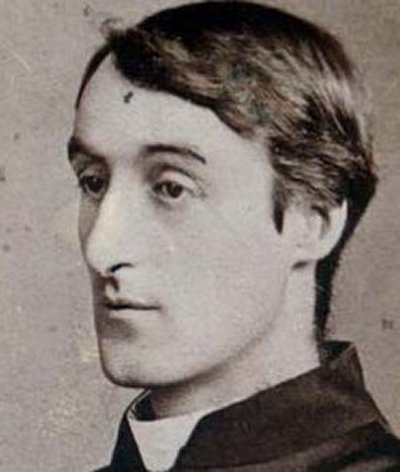
Gerard Manley Hopkins
(1844-1889)
Hurrahing in Harvest
Summer ends now; now, barbarous in beauty, the stocks rise
Around; up above, what wind-walks! what lovely behavior
Of silk-sack clouds! has wilder wilful-wavier
Meal-drift moulded ever and melted across skies?
I walk, I lift up, I lift up heart, eyes
Down all that glory in the heavens to glean our Saviour,
And éyes, heárt, what looks, what lips, yet gave you a
Rapturous love’s greeting of realer, of rounder replies?
And the azurous hung hills are his world-wielding shoulder
Majestic – as a stallion, stalwart, very violet-sweet! –
These things, these things were here and but the beholder
Wanting; which two when they once meet,
The heart rears wings bold and bolder
And hurls for him, O half hurls earth for him off under his feet.
1877
Gerard Manley Hopkins
Opgetogen in oogsttijd
Zomer zinkt nu; nu, schaamteloos schoon, zie schoven staan
Verspreid; daar omhoog, welk ‘n wind-waas! niet lieflijk milder
Kon ‘t zijde-zwerk zijn! is ‘n welbewust-welvender wilder
Meel-drift ooit gevormd en gesmolten in d’ hemelbaan?
Ik loop, ik richt op, ik richt op hart, oog
Langs al dat heil in ‘t firmament om d’ Heiland te lezen,
En óóg, hárt, welke blik, welke lip, gaf jullie ooit, dan deze,
Verrukter liefdesrespons in raker, in ronder vertoog?
En de hemelblauwe heuvels zijn, O hoe verheven,
Z’n aard-torsende torso – als ‘n ruige ruin, zeer lila zoet! –
Deez’ dingen, deez’ dingen waren hier, maar bleven
Zonder beschouwer; eenmaal elkaar ontmoet,
Voedt het hart vleugels gedreven, meer gedreven
En zwiept voor hem, O half zwiept voor hem aard vanonder z’n voet.
Vertaling Cornelis W. Schoneveld
Uit: Bestorm mijn hart, de beste Engelse gedichten uit de 16e-19e eeuw gekozen en vertaald door Cornelis W. Schoneveld, tweetalige editie. Rainbow Essentials no. 55, Uitgeverij Maarten Muntinga, Amsterdam, 2008, 296 pp, € 9,95 ISBN: 9789041740588
kempis.nl poetry magazine
More in: Archive G-H, Hopkins, Gerard Manley, More translations
Thank you for reading Fleurs du Mal - magazine for art & literature